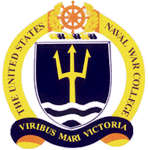United States Naval War College

Shield of the Naval War College
|
|
| Motto | Viribus mari victoria |
|---|---|
|
Motto in English
|
Victory by seapower |
| Type | Federal staff college |
| Established | 1884 |
| Location | Newport, Rhode Island, USA |
| President | RADM Jeffrey A. Harley |
| Website | www |
|
U.S. Naval War College
|
|

The Naval War College. The original Newport Asylum building can be seen on the far right, now housing the Naval War College Museum. The larger building on the left is Luce Hall.
|
|
| Location | Newport, Rhode Island |
| Coordinates | 41°30′28″N 71°19′46″W / 41.5077°N 71.3295°WCoordinates: 41°30′28″N 71°19′46″W / 41.5077°N 71.3295°W |
| Area | 4 acres (1.6 ha) |
| Architect | George C. Mason & Sons, others |
| Architectural style | Other |
| NRHP Reference # | 66000876 |
| Significant dates | |
| Added to NRHP | October 15, 1966 |
| Designated NHLD | January 29, 1964 |
The Naval War College (NWC or NAVWARCOL) is the staff college and "Home of Thought" for the United States Navy in Newport, Rhode Island. The NWC educates and develops leaders, supports defining the future Navy and associated roles and missions, supports combat readiness, and strengthens global maritime partnerships.
The college was established on October 6, 1884; its first president, Commodore Stephen B. Luce, was given the old building of the Newport Asylum for the Poor to house it on Coasters Harbor Island in Narragansett Bay. Among the first four faculty members were Tasker H. Bliss, a future Army Chief of Staff, James R. Soley, the first civilian faculty member and a future Assistant Secretary of the Navy, and, most famously, Captain (later, Rear Admiral) Alfred Thayer Mahan, who soon became renowned for the scope of his strategic thinking and influence on naval leaders worldwide.
The College engaged in wargaming various scenarios from 1887 on, and in time became a laboratory for the development of war plans. Nearly all of the U.S. naval operations of the twentieth century were originally designed and gamed at the NWC.
More than 50,000 students have graduated since its first class of 9 students in 1885 and about 300 of today’s active duty admirals and generals and senior executive service leaders are alumni. The college’s joint professional military education (JPME) programs prepare leaders for the challenges of operational and strategic leadership over the remainder of their careers as decision makers and problem solvers. More than 1,900 students have graduated from the Maritime Staff Operators Course, 200 from the Executive Level OLW Course, and more than 450 U.S. and international flag and general officers from the flag course. Just as its educational programs have expanded in depth and reach, so have the research and analysis efforts conducted by its Center for Naval Warfare Studies. Through war games, conferences, workshops, and publications, its research arm provides direct curriculum support to its educational programs and focused, task-driven analysis for fleet customers and government agencies across the national security spectrum.
...
Wikipedia


